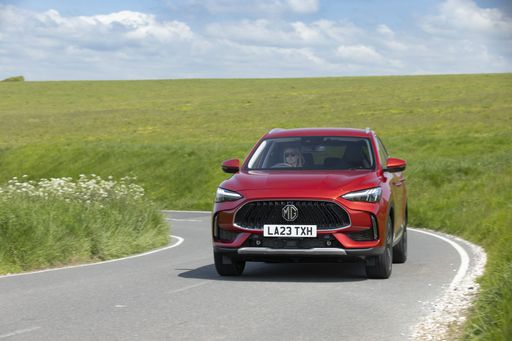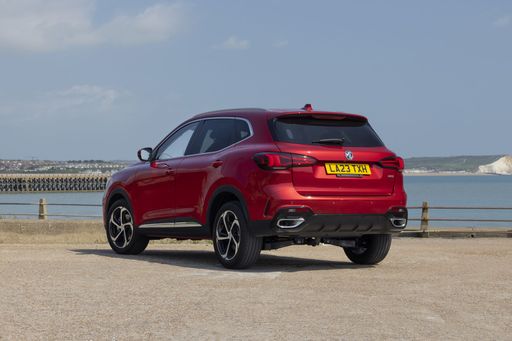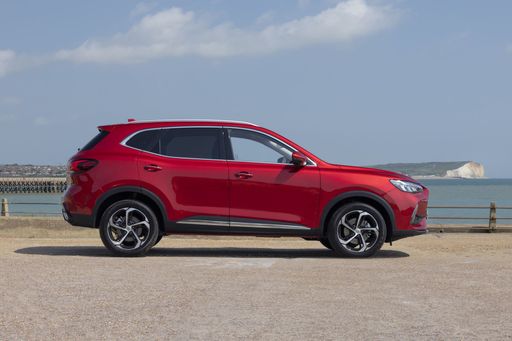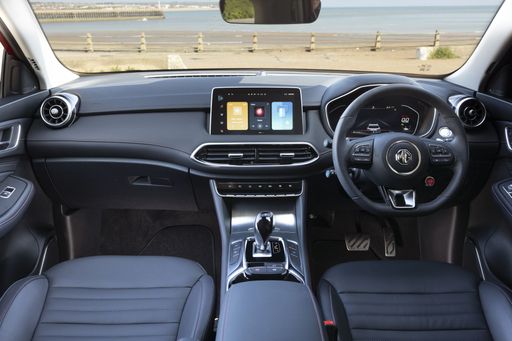VW Tiguan vs MG HS - Differences and prices compared
Compare performance (272 HP vs ), boot space and price (33300 £ vs ) at a glance. Find out which car is the better choice for you – VW Tiguan or MG HS?
Who wins the race in the data check?
The MG HS holds a very small edge in the objective data comparison.
This result only shows which model scores more points on paper – not which of the two cars feels right for you.

MG HS
VW Tiguan
The VW Tiguan blends sensible family practicality with a dash of German polish, delivering a calm, reassuring ride and a cabin that never feels like an afterthought. For buyers who want an SUV that’s easy to live with yet still nicely dressed, the Tiguan is the grown‑up choice that keeps a cheeky wink in reserve.
details





MG HS
The MG HS looks sharper than its price tag suggests, pairing bold styling with a roomy, well-finished cabin that feels more upscale than you’d expect. It’s a sensible, well-equipped compact SUV that gives mainstream rivals a run for their money and adds enough personality to make everyday driving enjoyable.
details



Costs and Consumption |
|
|---|---|
|
Price
33300 - 51900 £
|
Price
-
|
|
Consumption L/100km
1.4 - 8.4 L
|
Consumption L/100km
-
|
|
Consumption kWh/100km
-
|
Consumption kWh/100km
-
|
|
Electric Range
118 - 126 km
|
Electric Range
-
|
|
Battery Capacity
19.70 kWh
|
Battery Capacity
-
|
|
co2
32 - 190 g/km
|
co2
-
|
|
Fuel tank capacity
45 - 58 L
|
Fuel tank capacity
-
|
Dimensions and Body |
|
|---|---|
|
Body Type
SUV
|
Body Type
-
|
|
Seats
5
|
Seats
-
|
|
Doors
5
|
Doors
-
|
|
Curb weight
1599 - 1890 kg
|
Curb weight
-
|
|
Trunk capacity
490 - 652 L
|
Trunk capacity
-
|
|
Length
4539 mm
|
Length
-
|
|
Width
1842 - 1859 mm
|
Width
-
|
|
Height
1656 - 1658 mm
|
Height
-
|
|
Max trunk capacity
1486 - 1650 L
|
Max trunk capacity
-
|
|
Payload
460 - 533 kg
|
Payload
-
|
Engine and Performance |
|
|---|---|
|
Engine Type
Petrol, Petrol MHEV, Diesel, Plugin Hybrid
|
Engine Type
-
|
|
Transmission
Automatic
|
Transmission
-
|
|
Transmission Detail
Dual-Clutch Automatic
|
Transmission Detail
-
|
|
Drive Type
All-Wheel Drive, Front-Wheel Drive
|
Drive Type
-
|
|
Power HP
130 - 272 HP
|
Power HP
-
|
|
Acceleration 0-100km/h
5.9 - 10.6 s
|
Acceleration 0-100km/h
-
|
|
Max Speed
210 - 242 km/h
|
Max Speed
-
|
|
Torque
220 - 400 Nm
|
Torque
-
|
|
Number of Cylinders
4
|
Number of Cylinders
-
|
|
Power kW
96 - 200 kW
|
Power kW
-
|
|
Engine capacity
1498 - 1984 cm3
|
Engine capacity
-
|
General |
|
|---|---|
|
Model Year
2024 - 2025
|
Model Year
-
|
|
CO2 Efficiency Class
G, D, E, F, B
|
CO2 Efficiency Class
-
|
|
Brand
VW
|
Brand
-
|
What drivetrain options does the VW Tiguan have?
The VW Tiguan is offered with All-Wheel Drive or Front-Wheel Drive.
